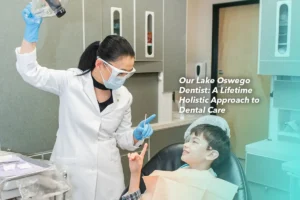Scaling and root planing are two procedures that comprise an oral deep cleaning process that we perform on some patients. Scaling employs special dental instruments used to remove plaque and toxic bacterial matter from the surfaces of the teeth. Emphasis is placed on surfaces below the gum line, where bacteria that could cause infections and other non-optimum particles are removed.
Following the scaling procedure, we inspect your teeth for any locations on the root of the tooth which show rough or uneven areas. These troublesome areas are particularly prone to accumulation of unwanted deposits and harmful bacteria. The root planing process smoothes the surface of the tooth, making accumulation of unhealthy bacteria more difficult. The depths of any areas below the gum line which are harboring the bacteria and are encouraging its growth are reduced. Inflammation (which causes bleeding) from infection is reduced as well.
Although some of our patients require only one visit for the procedure, others may require multiple visits. Depending upon the depth of the pockets, we may apply a local anesthetic to minimize your discomfort.
Foods That Can Contribute to Tartar and Plaque Formation
The primary culprit for the formation of bacteria in the mouth is refined sugar. Refined sugar dates back thousands of years, and numerous studies exist showing the negative effect it can have on healthy teeth. Around 500 BCE, farmers in India created a crystallized form of sugar cane juice called “khanda”…the origin of the word “candy”. Today, we all know what too much candy can do.
However, sugar is not the only cause of the production of harmful bacteria in the mouth. Starchy foods such as bread and pasta break down into simple sugars and provide food for bacteria. Any food, such as flavored milk or yogurt, which has added sugar can feed bacteria.
Other types of foods to look out for are those that increase acidity in the mouth, which can lead to the erosion of tooth enamel. Some examples include highly processed foods, coffee, some cheeses, sodas, and fish. The erosion caused by acidic foods can allow plaque to adhere to the tooth more easily.
To help avoid detrimental effects of these foods, you can rinse your mouth with water after eating. I also recommend brushing twice daily and regular flossing to remove food particles between your teeth, and regular checkups at Dental Arts and Wellness.
It’s also important to point out that there are lots of vegetables (beets, broccoli, and peas), nuts, legumes that are alkaline and can help to balance the body’s natural pH levels.
So, what happens in more serious cases? Let’s go over a treatment for severe infections.
One of the most common chronic infections we see in our office is “gum disease”. Mild gum disease (gingivitis), if left untreated, can rapidly worsen and may develop into severe gum disease (periodontitis). Periodontitis is often associated with inflammation and bleeding of the gums, and can result in permanent bone damage and loss of teeth.
Periodontitis causes “pockets” to form between your healthy gums and your teeth. These pockets are spaces between the gums and teeth that are formed when bacteria accumulate between the teeth and the gums. If not addressed, the bacterial infection becomes progressively worse. Scaling and root planing are essential in reducing the size of these pockets so that the bacterial infection can be eliminated, and the gums can reattach to the teeth. An added benefit is an immediate lessening of any discomfort being caused by the infected gums.
Benefits of Periodontal Scaling and Root Planing Procedures
For my patients with gum disease, scaling and root planing are a critically important aspect of dental care. The benefits include:
1. Curtailment of harmful oral bacteria: Scaling and root planing decrease or eliminate bacteria in your mouth and can help prevent systemic health issues that have been linked to gum disease. Bacteria that cause gum disease may migrate to the bloodstream and cause inflammation in other parts of the body, contributing to respiratory infections, complications in pregnancy, cardiovascular disease, and diabetes. By addressing gum disease as early as possible, you can reduce the risk of these other health problems.
2. Removal of Tartar and Plaque: In addition to removing bacteria, tartar and plaque removal, especially from below the gum line, is an essential aspect in the prevention of those subsequent periodontal problems.
3. Prevention of Tooth Loss: Treating gum disease is an imperative part of eliminating tooth and bone loss by helping support the structures that help hold your teeth in place. Healthy bones are a vital part of your facial structure.
4. Healthier Gums: Cleaning the roots of the teeth and smoothing the tooth surfaces can help reduce or eliminate gum inflammation.
5. Enhanced Oral Hygiene: Because cleaner tooth surfaces are much less likely to accumulate the plaque formed from bacteria, my patients often find a good oral hygiene regimen to be more straightforward and less complicated, as cleaner surfaces are less likely to accumulate plaque. With shallower pockets, my patients make their daily cleaning more thorough.
6. More Economical Future Solutions: As periodontitis becomes more severe, more advanced treatments and surgeries are required. Early intervention helps prevent more costly surgical treatments, tooth extractions, and prosthetics. You save money and avoid
the discomfort of complicated and invasive procedures.
7. A More Attractive Smile: As periodontal disease gets progressively worse, it leads to visible signs such as tooth exposure and gum recession. The elimination of receding gum lines and gum inflammation can contribute to a more pleasant and appealing smile. My patients have also reported a more comfortable bite and fresher breath.
Follow-Up Care: Essential Steps After Scaling and Root Planing
Following the treatment, you may experience some sensitivity, but it normally goes away within a few days as your gums heal. I recommend that you avoid frequent intake of foods that are hard and beverages that are hot. I also suggest a gentle brushing routine for a few days.
Regular dental check-ups are an important part of maintaining a healthy mouth. Call our office today to schedule an appointment.




